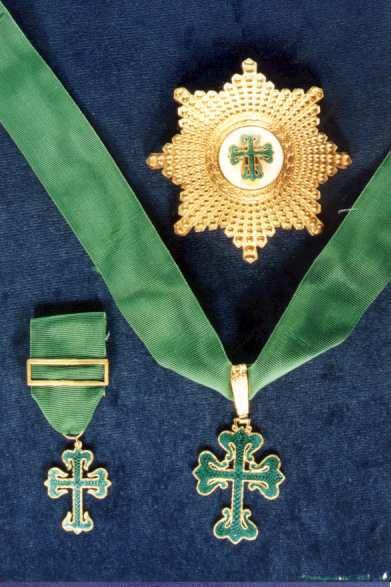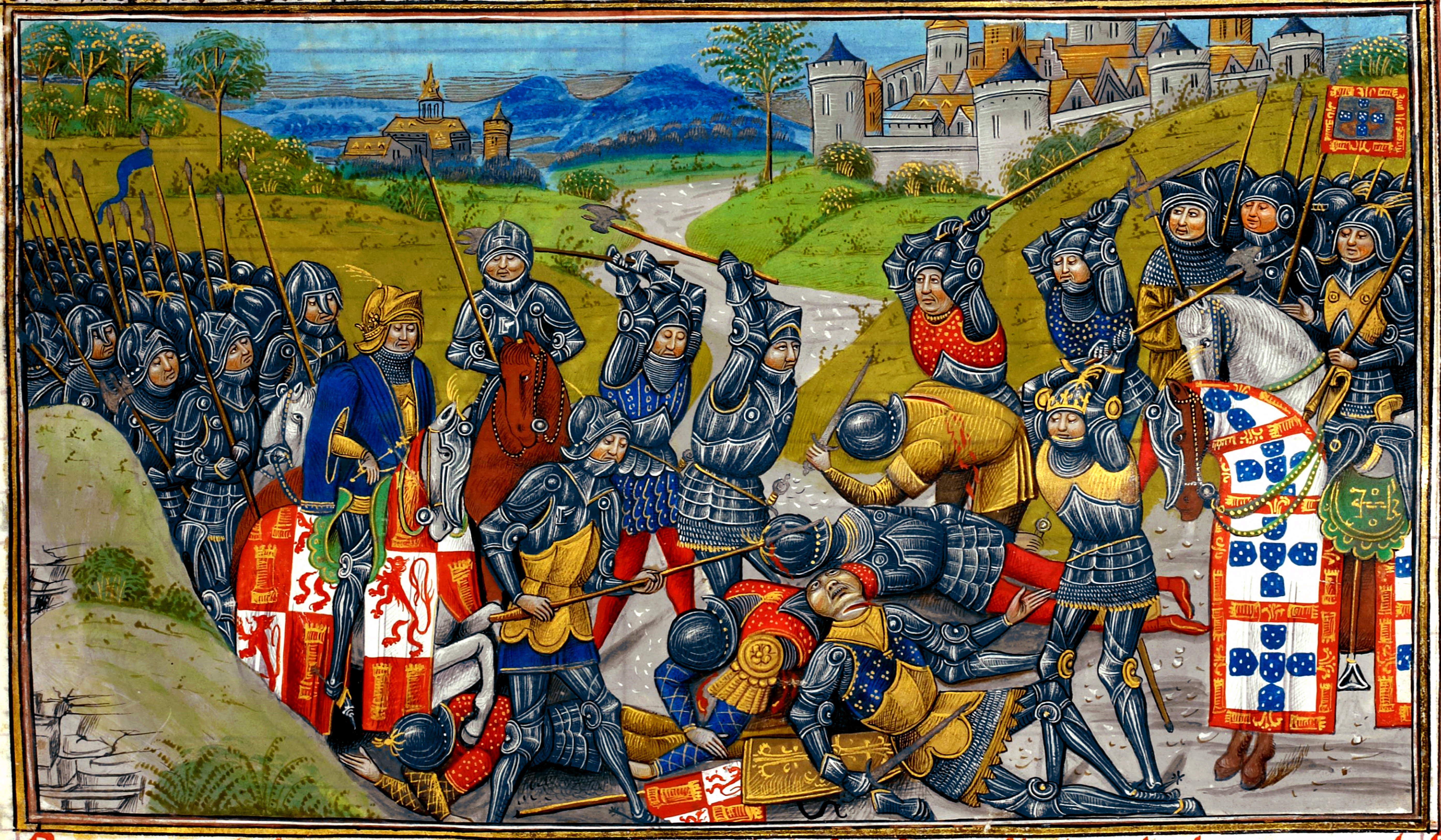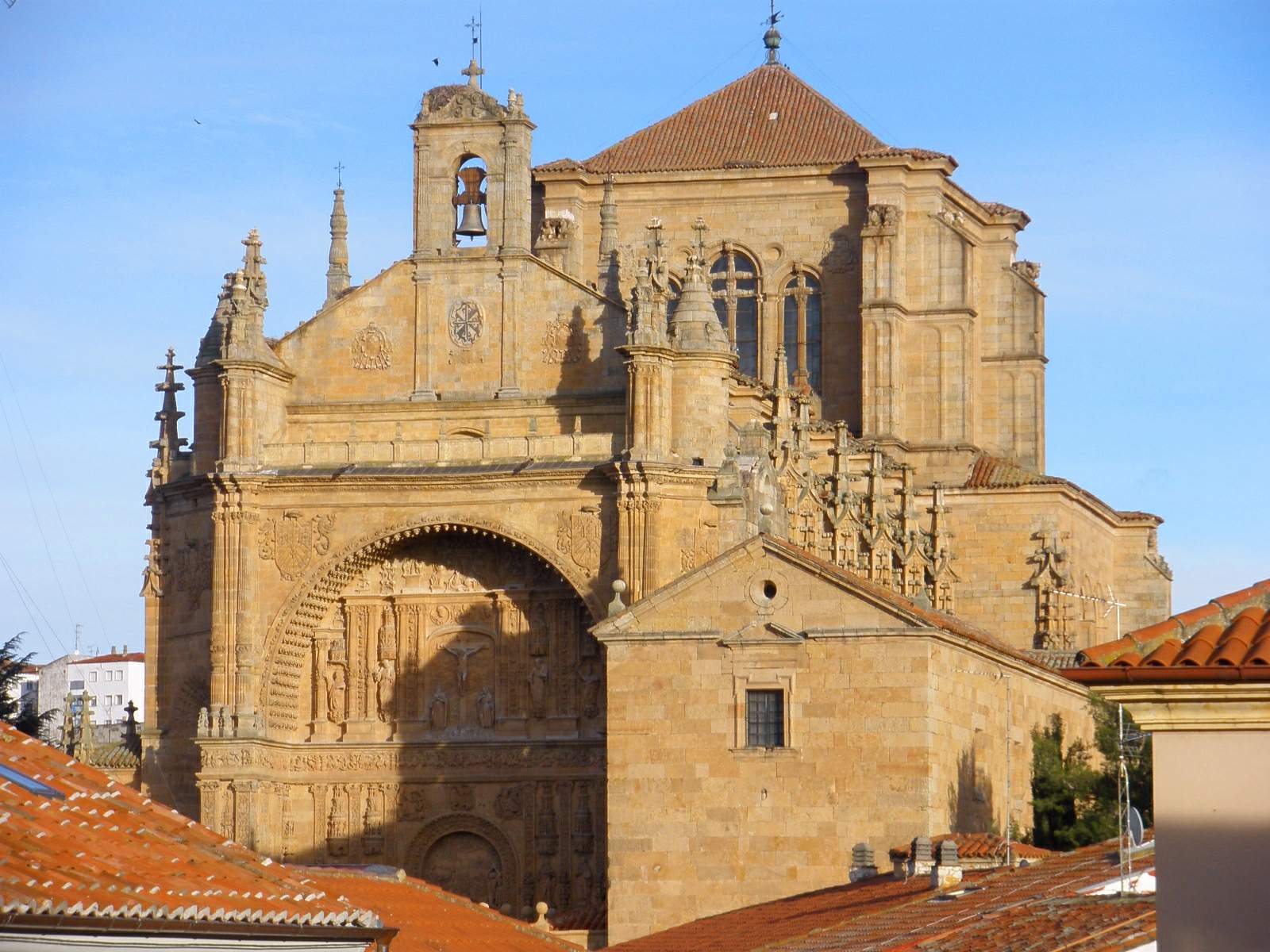|
João Das Regras
João das Regras (??? - 3 May 1404), in English, literally John of the Rules, was a Portuguese jurist of the second half of the 14th century. In the context of the 1383—1385 Crisis, in Portugal, he stood out for his masterly representation for the cause of the Master of Avis in the Coimbra Courts of 1385, the corollary of which was his acclaim as King of Portugal. Life Born in Lisbon at an unknown date, he was the son of João Afonso das Regras and Sentil Esteves, João das Regras became a stepson of Álvaro Pais, the chief chancellor of the Portuguese Kingdom, after his mother's second marriage. According to the Portuguese chronicler Fernão Lopes, João das Regras studied in the University of Bologna. Later, João das Regras became a professor in the University of Lisbon and in October 1400, became the Protector of the University (a title that nowadays can be compared to that of a Rector). Although he was reputed to have defended the creation of a compilation of laws and, ... [...More Info...] [...Related Items...] OR: [Wikipedia] [Google] [Baidu] |
Lisbon
Lisbon (; pt, Lisboa ) is the capital and largest city of Portugal, with an estimated population of 544,851 within its administrative limits in an area of 100.05 km2. Grande Lisboa, Lisbon's urban area extends beyond the city's administrative limits with a population of around 2.7 million people, being the List of urban areas of the European Union, 11th-most populous urban area in the European Union.Demographia: World Urban Areas - demographia.com, 06.2021 About 3 million people live in the Lisbon metropolitan area, making it the third largest metropolitan area in the Iberian Peninsula, after Madrid and Barcelona. It represents approximately 27% of the country's population. [...More Info...] [...Related Items...] OR: [Wikipedia] [Google] [Baidu] |
Order Of Aviz
The Military Order of Saint Benedict of Aviz ( pt, Ordem Militar de São Bento de Avis, ), previously to 1910 ''Royal Military Order of Saint Benedict of Aviz'' ( pt, Real Ordem Militar de São Bento de Avis), previously to 1789 ''Knights'' (of the ''Order) of Saint Benedict of Aviz'' ( pt, Ordem de São Bento de Aviz) or ''Friars of Santa Maria of Évora'', is a Portuguese order of chivalry, founded in Portugal in 1146. It gave its name and coat of arms to the Aviz Dynasty that ruled Portugal between 1385 and 1580. Early history The order, as a monastic military order, was founded in emulation of such military orders as the Knights Templar, which existed in Portugal as early as 1128, and received a grant from Theresa, Countess of Portugal in the year of the Council of Troyes, which confirmed their early statutes. A native order of this kind sprang up in Portugal about 1146. Afonso, the first king, gave to it the town of Évora, captured from the Moors in 1166, and the Knights ... [...More Info...] [...Related Items...] OR: [Wikipedia] [Google] [Baidu] |
Antipope
An antipope ( la, antipapa) is a person who makes a significant and substantial attempt to occupy the position of Bishop of Rome and leader of the Catholic Church in opposition to the legitimately elected pope. At times between the 3rd and mid-15th centuries, antipopes were supported by important factions within the Church itself and by secular rulers. Sometimes it was difficult to distinguish which of two claimants should be called pope and which antipope, as in the case of Pope Leo VIII and Pope Benedict V. Persons who merely claim to be pope and have few followers, such as the modern conclavist antipopes, are not classified with the historical antipopes. History Hippolytus of Rome (d. 235) is commonly considered to be the earliest antipope, as he headed a separate group within the Church in Rome against Pope Callixtus I. Hippolytus was reconciled to Callixtus's second successor, Pope Pontian, and both he and Pontian are honoured as saints by the Catholic Church with ... [...More Info...] [...Related Items...] OR: [Wikipedia] [Google] [Baidu] |
John I Of Castile
John I ( es, Juan I; 24 August 1358 – 9 October 1390) was King of Castile and León from 1379 until 1390. He was the son of Henry II and of his wife Juana Manuel of Castile. Biography His first marriage, to Eleanor of Aragon on 18 June 1375, produced his only known issue : # Henry (4 October 1379 – 25 December 1406), succeeded his father as King of Castile.C.W. Previte-Orton, ''The Shorter Cambridge Medieval History'', Volume 2, (Cambridge at the University Press, 1912), 902. # Ferdinand (27 November 1380 – 2 April 1416), became King of Aragon in 1412. # Eleanor (b. 13 August 1382), died young. In 1379, John I formed the short lived military order of the Order of the Pigeon, known for its large feasts which included eating the organization's namesake, the pigeon. Unlike his father, John I seems to have been more tolerant towards Jews, even making legal exemptions for some, such as Abraham David Taroç. He ransomed Leo V of the House of Lusignan, the last Latin king of ... [...More Info...] [...Related Items...] OR: [Wikipedia] [Google] [Baidu] |
Dispensation (Western Christian)
In the jurisprudence of the canon law of the Catholic Church, a dispensation is the exemption from the immediate obligation of law in certain cases.The Law of Christ Vol. I, pg. 284 Its object is to modify the hardship often arising from the rigorous application of general laws to particular cases, and its essence is to preserve the law by suspending its operation in such cases. Concept Since laws aimed at the good of the entire community may not be suitable for certain cases or persons, the legislator has the right (sometimes even the duty) to dispense from the law. Dispensation is not a permanent power or a special right as in privilege. If the reason for the dispensation ceases entirely, then the dispensation also ceases entirely.The Law of Christ Vol. I, pg. 285 If the immediate basis for the right is withdrawn, then the right ceases. Validity, legality, "just and reasonable cause" There must be a "just and reasonable cause" [...More Info...] [...Related Items...] OR: [Wikipedia] [Google] [Baidu] |
Ferdinand I Of Portugal
Ferdinand I ( pt, Fernando; 31 October 1345 – 22 October 1383), sometimes called the Handsome () or occasionally the Inconstant (), was the King of Portugal from 1367 until his death in 1383. His death led to the 1383–85 crisis, also known as the Portuguese interregnum. Life Ferdinand was born in Coimbra, the second but eldest surviving son of Peter I and his wife, Constanza Manuel. On the death of Peter of Castile in 1369, Ferdinand, as great-grandson of Sancho IV by his grandmother Beatrice, laid claim to the vacant Castilian throne. The kings of Aragon and Navarre, and later John of Gaunt, Duke of Lancaster, who had married Peter of Castile's eldest daughter, Constance, also claimed the throne. The throne was held by his second cousin Henry of Trastámara (Henry II of Castile), Peter of Castile's illegitimate brother, who had defeated him in the Castilian Civil War in 1366 and assumed the crown. After one or two indecisive campaigns, all parties were ready to a ... [...More Info...] [...Related Items...] OR: [Wikipedia] [Google] [Baidu] |
John, Lord Of Alba De Tormes
John of Portugal ( pt, João ), occasionally surnamed Castro (1352), was the eldest surviving son of King Peter I of Portugal by his mistress Inês de Castro. He was a potential but unsuccessful contender for the Portuguese throne during the 1383–85 crisis of succession. Background John was the son of the Portuguese King Peter I and his lover Inês de Castro, a Galician noblewoman who had arrived in Portugal as a lady-in-waiting to Infanta Constance of Castile, recently married to Pedro I (royal heir at the time). The status of John as Infante of Portugal is a debatable subject. Some historians consider him a natural son of Peter I, and so assert that the title 'Infante of Portugal' could not be attributed to him. Others refer to the circumstances of the death of Inês de Castro, ordered by Peter's father, King Afonso IV of Portugal: after inheriting the throne, the Prince admitted he had married Inês secretly, therefore she was a lawful Queen of Portugal and he was legitimi ... [...More Info...] [...Related Items...] OR: [Wikipedia] [Google] [Baidu] |
Denis, Lord Of Cifuentes
Denis of Portugal (Portuguese: 'Dinis' or 'Diniz' ), occasionally surnamed Castro (1353 – ), was an infante of Portugal. He was the son of Portuguese King Peter I and a Galician noblewoman named Inês de Castro who had arrived in Portugal as a maid of princess Constance of Castile, recently married to Pedro I (Heir Prince at the time). History Considering Denis an ''Infante of Portugal'' is a debatable subject. Some historians consider him a natural son of Peter I, so the title Infante of Portugal could never be attributed to him. Other opinions refer that after the death of Inês de Castro, ordered by Pedro's father King Afonso IV of Portugal, the Prince after inheriting the throne admitted that he had married Inês secretly, and because of that she was a lawful Queen of Portugal. After the death of his mother Denis left Portugal to Castile with his brother but during the 1383–85 Crisis he was one of the claimants to the throne along with Beatrice of Portugal (his nie ... [...More Info...] [...Related Items...] OR: [Wikipedia] [Google] [Baidu] |
Juan I Of Castile
John I ( es, Juan I; 24 August 1358 – 9 October 1390) was King of Castile and León from 1379 until 1390. He was the son of Henry II and of his wife Juana Manuel of Castile. Biography His first marriage, to Eleanor of Aragon on 18 June 1375, produced his only known issue : # Henry (4 October 1379 – 25 December 1406), succeeded his father as King of Castile.C.W. Previte-Orton, ''The Shorter Cambridge Medieval History'', Volume 2, (Cambridge at the University Press, 1912), 902. # Ferdinand (27 November 1380 – 2 April 1416), became King of Aragon in 1412. # Eleanor (b. 13 August 1382), died young. In 1379, John I formed the short lived military order of the Order of the Pigeon, known for its large feasts which included eating the organization's namesake, the pigeon. Unlike his father, John I seems to have been more tolerant towards Jews, even making legal exemptions for some, such as Abraham David Taroç. He ransomed Leo V of the House of Lusignan, the last Latin king of ... [...More Info...] [...Related Items...] OR: [Wikipedia] [Google] [Baidu] |
Beatrice Of Portugal
Beatrice ( pt, Beatriz, ; 7–13 February 1373 – ) was the only surviving legitimate child of King Ferdinand I of Portugal and his wife, Leonor Teles. She became Queen consort of Castile by marriage to King John I of Castile. Following her father's death without a legitimate male heir, she claimed the Portuguese throne, but lost her claim to her uncle, who became King John I of Portugal, founder of the House of Aviz. During her early years, Beatrice was a pawn in the changing politics of foreign alliances of her father, who negotiated successive marriages for her. She would eventually marry King John I of Castile, by whom Beatrice became Queen consort of Castile. At the death of her father, Beatrice was proclaimed Queen regnant of Portugal and her mother assumed the regency in her name. Opposition to the regency, fear of the Castilian domination and loss of Portuguese independence led to a popular rebellion and civil war between the late King Ferdinand I's illegitimate brother, ... [...More Info...] [...Related Items...] OR: [Wikipedia] [Google] [Baidu] |
Lawyer
A lawyer is a person who practices law. The role of a lawyer varies greatly across different legal jurisdictions. A lawyer can be classified as an advocate, attorney, barrister, canon lawyer, civil law notary, counsel, counselor, solicitor, legal executive, or public servant — with each role having different functions and privileges. Working as a lawyer generally involves the practical application of abstract legal theories and knowledge to solve specific problems. Some lawyers also work primarily in advancing the interests of the law and legal profession. Terminology Different legal jurisdictions have different requirements in the determination of who is recognized as being a lawyer. As a result, the meaning of the term "lawyer" may vary from place to place. Some jurisdictions have two types of lawyers, barrister and solicitors, while others fuse the two. A barrister (also known as an advocate or counselor in some jurisdictions) is a lawyer who typically specia ... [...More Info...] [...Related Items...] OR: [Wikipedia] [Google] [Baidu] |





